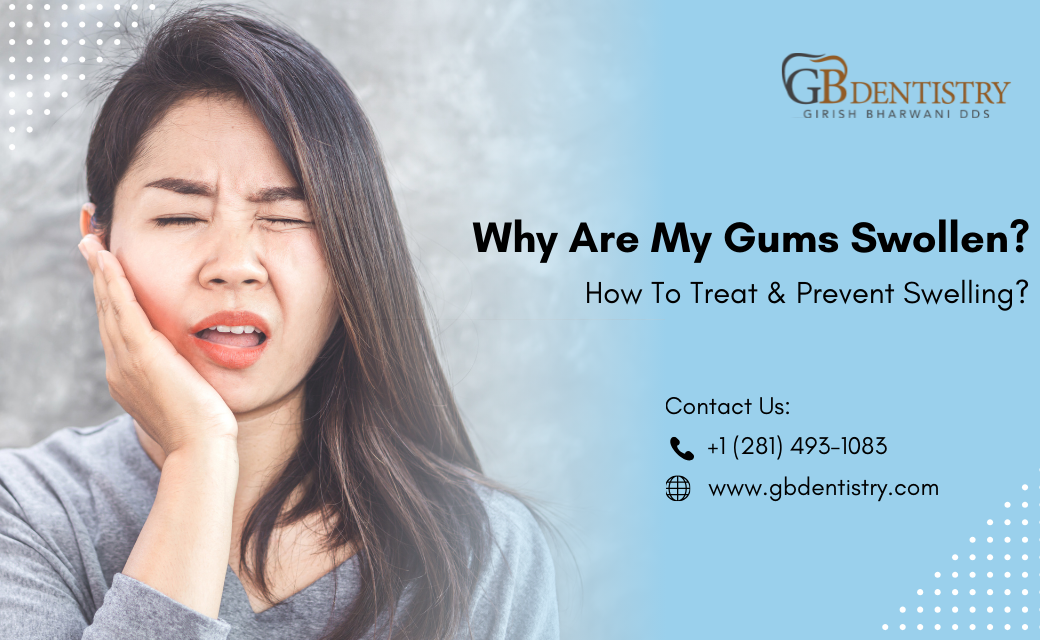Is In-Office Teeth Whitening Safe? Benefits & Considerations
Is in office teeth whitening safe? Learn how GB Dentistry in Memorial offers fast, effective results with care from an in office teeth whitening dentist.

Swollen gums are a common dental concern that can cause discomfort and affect your oral health. Understanding the reasons behind gum swelling and the appropriate measures to treat and prevent it is crucial for maintaining a healthy mouth.
Swollen gums are typically a sign of inflammation, often caused by the accumulation of plaque—a sticky film of bacteria—on your teeth. If plaque isn’t removed, it can irritate your gum tissue, leading to swelling, redness, and sometimes bleeding during brushing or flossing. This condition, if left unchecked, can progress to more serious forms of gum disease, potentially affecting your overall dental health and leading to tooth loss.
Swollen gums tend to look red and feel puffy or engorged compared to healthy gums. They may protrude more than usual and can be sensitive or painful to touch. In some cases, you might notice that your gums bleed more easily, especially when you’re brushing your teeth or eating hard food.

The most common cause of swollen gums is the buildup of plaque at the gumline. This plaque harbors bacteria that produce toxins, which can irritate and inflame the gums. Other contributing factors include:
Some Dental Causes:
Some Other Causes:
At GB Dentistry, we approach the treatment of swollen gums with a personalized plan tailored to each patient’s specific needs. After a thorough examination to identify the cause of the swelling, we may recommend treatments such as:
Dr. Bharwani also provides detailed information on the causes of gum swelling and the treatments available, emphasizing the importance of ongoing care and maintenance to prevent future issues.
While professional treatment is essential, there are several home remedies that can help alleviate the symptoms of swollen gums:
Yes, gum swelling can subside with appropriate treatment. It’s important to address the issue promptly to prevent further complications. Professional dental care is crucial in treating the underlying causes of swollen gums and ensuring the problem does not recur.
You should contact your dentist in Memorial if the swelling lasts longer than a week, if it’s accompanied by severe pain, or if over-the-counter medications do not provide relief. These could be signs of a more serious condition that requires professional attention.
When visiting your dentist, consider asking questions such as:
The gum around a single tooth may become swollen due to a localized infection, such as an abscess, or because of food particles trapped between the tooth and gum, causing irritation.
Braces can lead to swollen gums if they trap food and plaque, making it difficult to maintain proper oral hygiene. It’s important to follow your dentist’s instructions for cleaning around braces to prevent gum issues.
In my professional experience, addressing gum swelling early is the key to maintaining not only oral health but also overall health. Ignoring swollen gums can lead to more serious dental problems and negatively impact your quality of life. Regular dental check-ups and proper oral hygiene are the best defenses against gum swelling.
Regular brushing, flossing, and rinsing with saltwater can reduce swelling. For persistent issues, professional cleaning and treatment from GB Dentistry can address the root cause and restore gum health.
Quick relief involves thorough oral hygiene, antimicrobial rinses, and in some cases, antibiotics. GB Dentistry offers expert care to treat infections effectively and prevent recurrence.
While mouthwash can reduce bacteria and inflammation, it is not a standalone solution for severe cases. GB Dentistry recommends a professional evaluation to identify the underlying cause.
Infected gums may appear red, swollen, and bleed easily, often accompanied by pain or pus. Swollen gums without infection are usually less severe but still require attention. GB Dentistry provides accurate diagnoses and effective treatments.
Infected gums are typically red, swollen, and may bleed or emit an unpleasant odor. If left untreated, the condition can worsen. GB Dentistry ensures timely and effective care to address gum infections.
Yes, gums can swell due to irritation from food particles, hormonal changes, or poor oral hygiene. GB Dentistry helps determine the cause and provides appropriate care to reduce swelling.
Antibiotics may be prescribed for severe infections, but professional cleaning and targeted treatments at GB Dentistry are essential for complete resolution and long-term gum health.